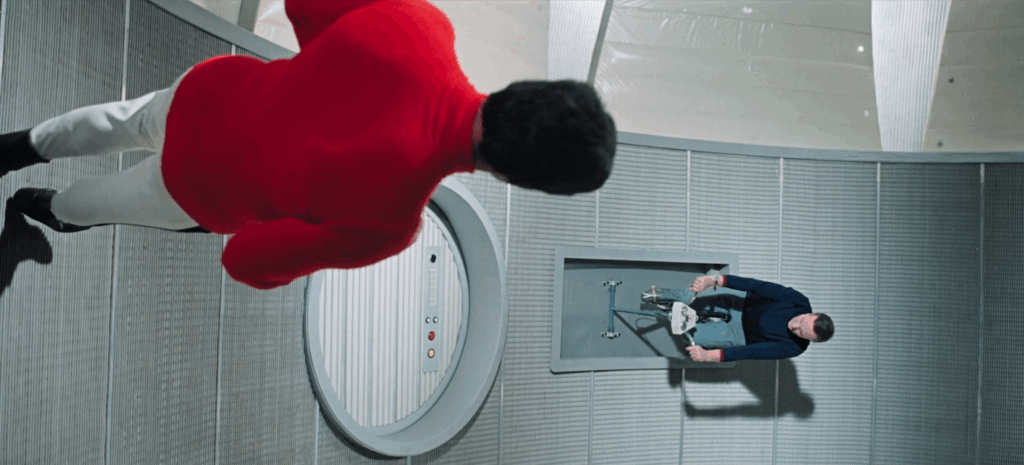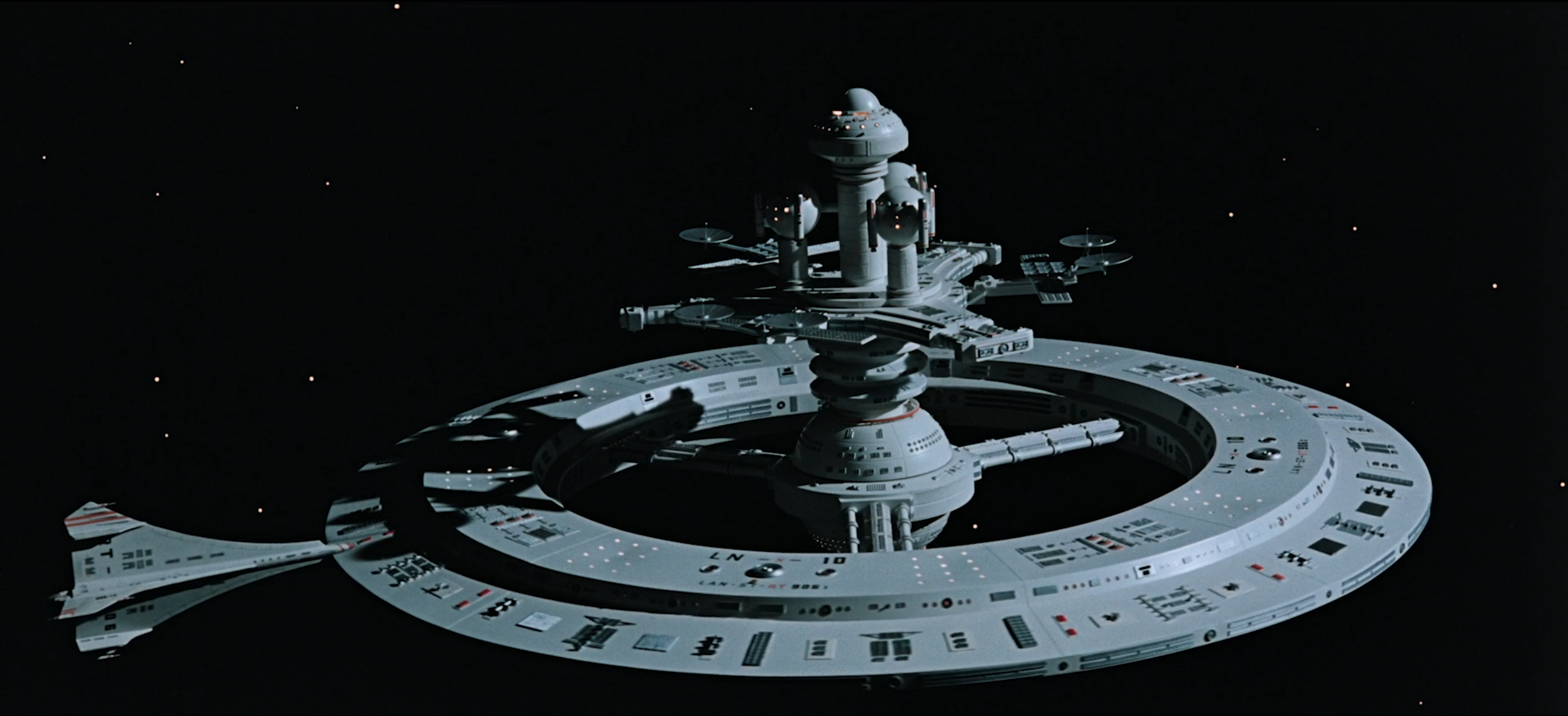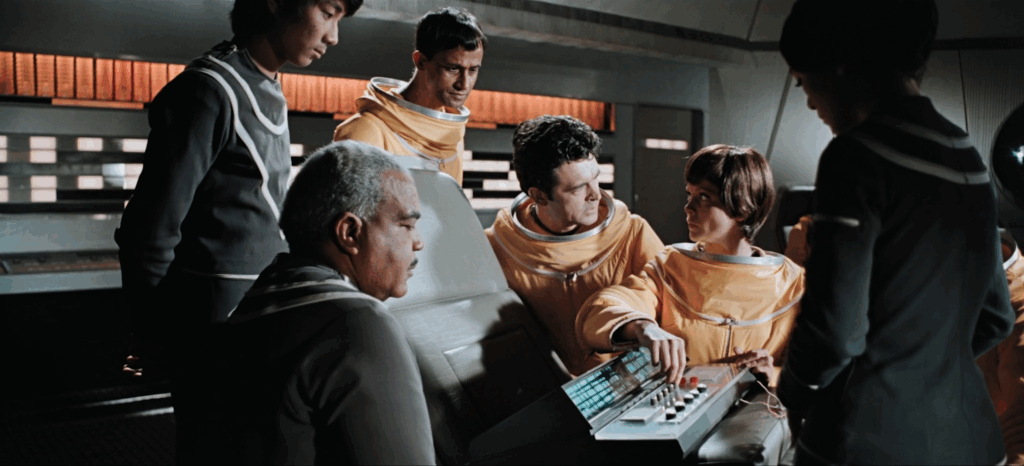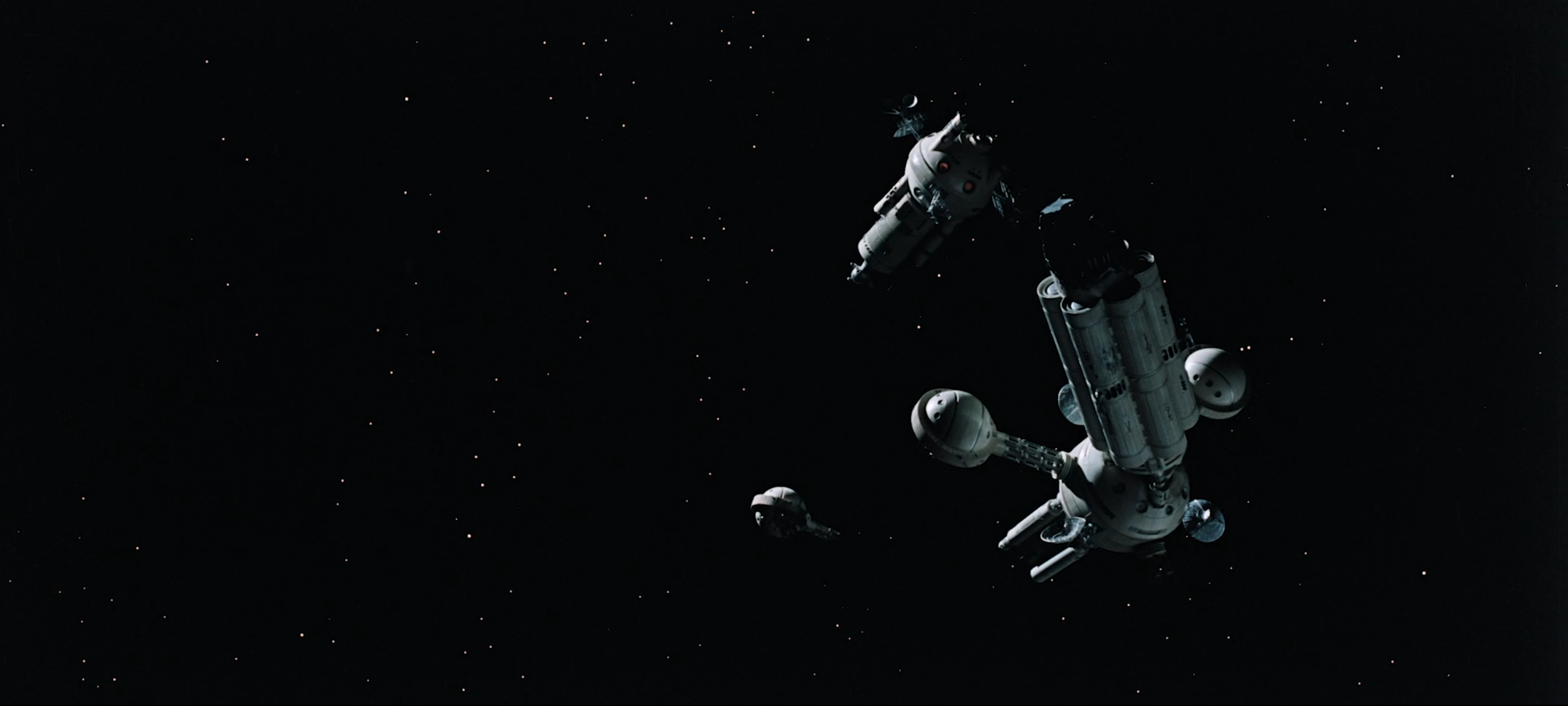About Signale – Ein Weltraumabenteuer (1970):
In the middle of the 21th century, a spaceship loses its bearings, and the commander of another space crew, seemingly on a routine check flight, decides to investigate.
The first and most ambitious of two epic space operas that prolific East German genre director Gottfried Kolditz (1922-1982) made for the state-run DEFA film studios, SIGNALS was DEFA’s cheeky attempt to outdo Kubrick’s 2001: A SPACE ODYSSEY behind the Iron Curtain. The film used many of the same tricks: expansive, visually stunning shots of the cosmos … gorgeous Futurist space-design with ergonomic chairs, IBM lookalike computers, Mod mini-dresses and “STAR TREK” space uniforms … even a copycat free-floating in tunnel sequence with a wild electronic Perry-Kingsley type score. Featuring breathtaking 70mm cinematography, recently restored in 6K from the original camera negative by the University of Massachusetts Amherst / DEFA Film Library for its first-ever world Blu-ray release by Deaf Crocodile.
The Blu-ray is available via Deaf Crocodile along with Koldtiz’s Im Straub der Sterne (In the Dust of the Stars).
Note: The film was adapted from Carlos Radsch’s Asteroidenjäger (1961)!
Shaun: Welp, we’re in my favorite era of science fiction film: the ’70s. There’s a reason I love this era. It’ll be decades before anything approaching passable computer graphics will hit cinemas, which means every ’70s science fiction film set in space has to rely on practical effects and visual trickery to give the impression of a vast cosmos, spaceships that are actually flying out there, technology and computers that can’t exist yet, and societies that feel like they’ve grown up enough that space travel doesn’t seem like such a big deal even if it’s still a bit dangerous.
All of that is present here in Signale – Ein Weltraumabenteuer (Signals: A Space Adventure in English). There’s a reason Deaf Crocodile, the new Blu-ray publisher/distributor of this film, gives a comparison to Stanley Kubrick’s 2001: A Space Odyssey in their description. They’re certainly not the first to make that comparison because, in many ways, this film is clearly inspired by Kubrick’s science fiction epic. On the one hand, this works beautifully for the film because so much attention is given to the set design that most of the sets feel like they might actually be what we’re seeing. Space lounges, advanced computers (by ’70s standards), interfaces of all kinds with buttons and knobs that can be manipulated, and even a giant “wheel” where many of our characters exercise to prove their fitness. And while I think the comparison to 2001 is justified, I also think this film deserves more recognition for its visual dedication than a simple comparison (though I won’t give it much love for its painfully slow flight sequences). There is so much rich detail in the sets (and in the clothing they wear) that you could easily rewatch this film and find new things to marvel at. They don’t *feel* like sets. They feel like the future.
Daniel: I loved a lot about this movie, but I can understand why many viewers would find it excruciating to get through. If you’re someone who is bored by parts of 2001: A Space Odyssey, or Tarkovsky’s Solyaris, then there’s certainly not going to be much of an adventure here in Kolditz’s Signale for one to enjoy. The plot of the film, and the characters who inhabit it, are extremely minimalist. That is one of the things that I like about Signale because it lets its social and political themes really come through. I’m sure we’ll talk about those aspects a little later, but first to echo you: This movie is just a visual delight of 1970s speculative fiction to behold (and – as I know you’ll get to eventually – to hear.)

Low quality versions of Signals can be found online easily enough, so it’s important to point out just how amazing Deaf Crocodile’s hard restoration work has been in presenting the movie to audiences in beautiful, clear glory. I’ve heard consistently great things about the films in their catalog so far, but this is the first I’ve gotten to see. A lot of their focus is on restoration and release of neglected animated and Eastern European pictures, and Signale is a great showcase of Deaf Crocodile’s commitment to both.
Towards the end of the film, characters celebrate the anniversary of one of their colleagues’ career in space by presenting him with a short animated feature on him they’ve created. It’s a strange aside in the movie, yet presents visually captivating animation that parallels the visuals that you mentioned. It also provides one of the most light-hearted and realistically human moments that focus on the happiness of an individual, contrasted profoundly with the depictions of vast space, routine work, and the emphasis on humanity as a collective.
I enjoyed Signals because it is that cerebral sort of SF that was more common in the 1970s, a style that granted me to ponder the movie’s themes and Kolditz’s intent while simply being awash in enjoyment of its sights and sounds.
Shaun: I’ll detour here to add to your note about Deaf Crocodile’s work on the Blu-ray release of this and Im Staub der Sterne (In the Dust of the Stars; 1976). This is an East German film produced within the political context of Germany before reunification. DEFA (Deutsche Film-Aktiengesellschaft) was the film studio controlled by the German Democratic Republic founded and authorized by the Soviet Military Administration. Daniela Berghahn in Hollywood Behind the Wall: The Cinema of East Germany notes (and it should be unsurprising to us today) that this had an impact on the reception of DEFA-produced films even after the reunification of Germany – accusations of socialist propaganda, overshadowing by West German films, and so on. In the last two decades or so, there has been an effort on the part of film scholars and universities like UM Amherst to bring attention to these films, archive them, and revitalize them. Deaf Crocodile’s new release is a part of that preservation process. Whatever we might think of this film as a film (though I would suggest we should think of this film on thematic and cultural grounds more than we should its narrative achievements), we have to give credit here to Deaf Crocodile and UM Amherst for the work to bring this film to the general public. This is film history we’re talking about. If not for all this work, you and I would likely not be talking about Signale right now.

Speaking of themes and culture: you mention the effort this film goes to highlight the happiness of an individual, and this made me think about the two beach sequences in this film (near the beginning and at the very end). Signale seems enormously interested in images of unity between human beings. Even when there is conflict between members of the crew or its command structure, those are offset by images of the crew lounging together, playing, and/or simply being in harmony together. The beach scenes highlight this to the extreme, with younger and older members of the crew (and wider society, we have to assume) behaving with almost childlike joy and wonder. The older members of the crew going into a walking handstand in both sequences is punctuated by images of men, woman, and children running, dancing, laughing, and playing in the dunes. This seemed like the core of the film to me: less about the adventure so much as the overwhelming sense that humanity has achieved something akin to happiness (and remarkable physical and mental health, I might add). It’s hard not to smile at these scenes. There’s so much joy on display throughout this film – even some childlike wonder, such as the introduction of the robot on the Laika and their delight at what it can do, however little. Its tone, thus, is considerably different from that of its most common comparison: 2001 or Solaris. From a technical perspective, it might be borrowing from those films, but thematically and tonally, it is not. If anything, this is not a film that asks “what is out there” but “how does a united society of human beings without worry or fear react to a crisis.”
Daniel: My comment seems to have prompted you to say exactly where I was going with it all, so no need for me to repeat all of what you already said so well! If you go look at other people’s comments on the movie, most (if not all) that mention the beach scenes criticize them as ridiculous, superfluous, or incongruous to the rest of the picture. But I’m completely with you on this and their vibe of childlike innocent play and happiness. Everyone is frolicking in this display of physical fitness and emotional joy.

Critics also seem apt to point out how the script includes mention of this potential alien signal that they are out investigating, yet they never encounter these aliens or even verify their existence. But the entire point of this possible alien contact is the discussion on the nature of an alien civilization that would reach the capability of interstellar travel and contact. They discuss how only a civilization that learned peace and cooperation in collective harmony could achieve this. They therefore quickly dismiss the idea that any alien contact would have any high probability of aggression or hostility.
The message here is clear: Humans can only hope to move beyond Earth through social unity and the abandonment of aggression and competition. This contrasts so wonderfully with the rugged individualism and larger-than-life heroes that rise to fight off alien threats that dominate so much (albeit not all) of American SF. Rather than an alien threat, the antagonism the characters of Signale face are natural threats and equipment failures that they are able to overcome through cooperation and clear, calm communication. Perhaps less “exciting” to watch, but very meaningful.
Since you tread into some of the things I had planned on saying, I’ll bring up something that I know you had noted along with me: the surprising diversity in cast and characters given the time period this movie was made. Obviously, this is consistent with the themes of human unity that pervade Signale. But it’s still really jarring when you see the diversity in skin color and sex among the interstellar crews and those based back on Earth. It’s never an explicit point of discussion, or even comment, but it’s an implicit point of distinction from, and criticism of, the racism and classism perceived as inherent to America and capitalism.
These depictions of utopic harmony and unity with diversity may be valid criticisms of certain societies while also being hypocritical propaganda that ignore problems within one’s own sociopolitical systems. Yet, even if idealized, they present an optimistic and hopeful portrayal of the future with values that are ahead of their time, at least in typical SF depictions of the era. Matching the visual depictions and the themes of the movie would be the orchestration, which I would argue musically stresses unity over individualism as well. But I know you have more to say on this!

Shaun: That theme of unity is uttered in the film by Veikko (Piotr Pawlowski), the commander of the mission. He pontificates somewhat philosophically that a civilization that reaches such an advanced point that it can travel through space would necessarily abandon motivations of aggression and destruction (the same thing you were pointing to earlier with regards to alien civilizations). To some degree, this is the film telling us what to think about the philosophy at the core of Signale, but I also think astute viewers will have figured this out by the time Veikko presents these ideas. Thus, while I think the film uses Veikko to speak to the audience here, it isn’t strictly to tell us what to think so much as to suggest a line of thought we should pursue beyond the film. Becoming a spacefaring civilization would (in theory) eventually free us from the vulgarities of the mid-20th century world.
There’s probably a propagandistic element to be considered here given the film’s production by DEFA (and Polish company Przedsiebiorstwo Realizacji Filmów Zespoły Filmowe – also state owned), which had a stated mission to promote socialist ideals (especially socialist realism). I don’t mention this as a criticism so much as an acknowledgement that the film would have been influenced by the politics of its time, and so promoting a particular idea of unity both visually and tonally has cinematic and historical relevance here. Cinematically, it is as you say: a presentation of a lack of competition or meaningful distinction between the various groups on display. Criticism can certainly be made about how perfectly this film presents this, but I don’t think we can ignore its obvious intent as an idealistic film – political, sure, but idealistic about what humans can do without a need to compete with one another.
That thematic, as you note, also presents itself through the music composed by Karl-Ernst Sasse. The music is definitively of its era, with sweeping orchestrations for the opening credits, upbeat late-60s orchestrations for most of the beach and “play” scenes, and somewhat chromatic orchestrations for scenes of suspense (and some electronic work, too). Outside of those areas, the film relies mostly on computerized sound effects – beeps and boops and robotic sounds to signify, I think, the artificial nature of space travel. I think the unity you’re talking about, though, comes up in those upbeat ’60s orchestrations – a style of music I wish I had a name for because it is endemic to that era of film. There are multiple scenes of people of all varieties simply being together, playing, and otherwise participating in activities together. Most of these occur on a beach, but some also occur in zero gravity scenes on the Laika and other sequences. The music, thus, clues you into the type of scene we’re watching: collectives, togetherness, and play. It also reminds us that these ideals are at the core of the society on display. The opening scene of the destruction of the Ikaros is immediately followed by a long sequence on the beach, where we watch children and adults in various acts of play and recreation. This scene eventually moves into the central plot – finding the Ikaros‘ crew – but we return to it at the end of the film with some of our main cast (and rescued crew members), where once more we see children and adults in play and the same upbeat style of music returns. If I were to distill the message of the film as reinforced by the music, it’s that by working together (as a kind of collective), we can overcome the terrifying emptiness of space to return once more to the idyllic and joy-filled landscape of the Earth.

Daniel: Despite its political propaganda I don’t recall the film ever even applying any nationalistic cant, which strikingly sets it apart from what I would expect out of a similar Hollywood film of the era, and that orchestration you talk about differentiates from bombastic scores that evoke patriotic style or classical works that call back to national composers of the past.
There are so many elements to Signale that make it fascinating and entertaining even amid its imperfections, slow progression, and stubborn avoidance of plot expectations. I would totally watch this again, and I’m so pleased there are outlets like Deaf Crocodile that are restoring films like this for a new release to film fans.
Shaun: I strongly agree with you here. I’ve said this many times before, but I will take a film that tries to do something interesting (philosophically, politically, socially, etc.) and fails than a film that doesn’t try to be anything at all and also fails. That’s not to say I think Signale fails absolutely. It is, as you note, unnecessarily slow in parts, especially many of the space sequences when we’re supposed to feel as if space travel is dangerous and full of tension. It’s hard to take an asteroid dodging sequence seriously when everything moves at a snail’s pace. However, the film’s focus on an idealistic future human culture and its occasional descent into philosophizing give us something worth re-exploring (as do the set and costume designs). There’s a quiet brilliance to this film that has stuck with me since I first watched it for this feature. If anyone is reading this now and is looking for a film that has something interesting to say about themes of unity, human space travel, civilizational progress, and cooperation, this would be well worth your time – and certainly well worth the price tag to put something cool on your physical media shelf!
Disclosure: We received a complimentary screener for this film from its publisher, Deaf Crocodile.







